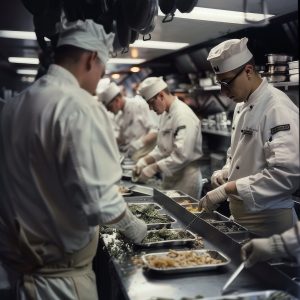Earn a Master’s Degree in Restaurant Management
A Master’s degree in Restaurant Management offers a transformative opportunity for those looking to advance their careers in the dynamic and competitive world of food service. This advanced program provides in-depth knowledge and skills necessary to excel in high-level management roles within the restaurant industry. From mastering operational efficiency to leading teams and driving financial success, the curriculum is designed to equip students with a comprehensive understanding of both the art and science of restaurant management.
This degree covers essential topics such as culinary operations, menu design, and customer service excellence and delves into strategic aspects like marketing, finance, and human resource management. Students gain practical experience through internships and real-world projects, allowing them to apply theoretical knowledge in real settings. The program emphasizes leadership development, empowering graduates to take on executive roles and make impactful decisions that drive restaurant success.
A master’s in restaurant management offers a competitive edge for aspiring restaurant owners, managers, or consultants. It provides the expertise needed to navigate industry challenges and innovate in a constantly evolving market. This post explores how this advanced degree can pave the way for career advancement and success in the vibrant world of restaurant management.
Prerequisites
Obtaining a Master’s degree in Restaurant Management involves several key steps and requirements, each designed to ensure students are well-prepared for advanced roles in the food service industry. Here’s a breakdown of what it typically takes:
1. Educational Prerequisites
- Bachelor’s Degree: Most programs require a bachelor’s degree in a related field, such as hospitality management, culinary arts, or business. However, some programs may accept degrees in other areas, provided the applicant has relevant experience or coursework.
2. Application Process
- Transcripts: Submission of official transcripts from previous academic institutions.
- Resume/Curriculum Vitae (CV): A detailed resume showcasing relevant work experience, particularly in the restaurant or hospitality industry.
- Letters of Recommendation: Typically, two or three letters from academic or professional references who can attest to the applicant’s qualifications and potential.
3. Standardized Tests
- GRE/GMAT Scores: Some programs may require GRE or GMAT scores, though this requirement varies by institution. Check specific program requirements to determine if these tests are necessary.
4. Personal Statement or Essay
- Statement of Purpose: A well-written essay outlining the applicant’s career goals, motivation for pursuing the degree, and how the program aligns with their professional aspirations.
5. Interview
- Interview: Some programs may require an interview as part of the admission process to assess the applicant’s suitability and enthusiasm for the program.
**6. Program Coursework
- Core Courses: Expect to complete coursework in advanced restaurant operations, menu design, financial management, marketing, and human resources.
- Electives: Some programs offer elective courses, allowing students to tailor their education to specific interests or career goals.
7. Practical Experience
- Internships: Many programs include practical components like internships or hands-on projects, providing real-world experience in restaurant management.
8. Capstone Project or Thesis
- Capstone Project: Completing a research project or thesis demonstrating the application of learned concepts to real-world restaurant management challenges.
9. Graduation Requirements
- Credits: Earning the required number of credit hours as specified by the program.
- Academic Performance: Maintaining a minimum GPA, typically around 3.0 or higher, depending on the program’s standards.
Completing these steps equips students with the advanced skills and knowledge needed for leadership roles in the restaurant industry, preparing them to drive innovation and succeed in a competitive field.
Schools Offering Degrees
Several universities and institutions in the United States offer Master’s degrees or similar advanced programs in Restaurant Management, Hospitality Management, or related fields. Here are some notable programs:
1. University of Nevada, Las Vegas (UNLV)
- Program: Master of Science in Hospitality Management
- Overview: UNLV offers specialized restaurant management, operations, and leadership courses. It is renowned for its strong hospitality program and connections within the industry.
2. Cornell University
- Program: Master of Management in Hospitality (MMH)
- Overview: Provides a comprehensive curriculum focusing on restaurant management, operational strategies, and financial management. Cornell’s School of Hotel Administration is highly regarded in the field.
3. University of Houston
- Program: Master of Science in Hospitality Management
- Overview: Offers restaurant management, food service operations, and strategic management courses. The program emphasizes practical experience through internships and industry partnerships.
4. Michigan State University
- Program: Master of Science in Hospitality Business
- Overview: Includes coursework in restaurant management, operations, and strategic planning. The program focuses on both practical and theoretical aspects of the industry.
5. Florida International University (FIU)
- Program: Master of Science in Hospitality Management
- Overview: Features courses in restaurant management, food service operations, and business management, focusing on the global hospitality industry.
6. San Diego State University
- Program: Master of Science in Hospitality and Tourism Management
- Overview: Offers a specialization in restaurant and food service management, emphasizing leadership, operational efficiency, and strategic planning.
7. University of Central Florida
- Program: Master of Science in Hospitality Management
- Overview: Includes a concentration in restaurant management and operations, focusing on the industry’s managerial and operational aspects.
8. University of South Carolina
- Program: Master of International Hospitality and Tourism Management
- Overview: Provides a global perspective on hospitality and restaurant management, including coursework on international food service operations and management strategies.
These programs offer advanced training and education in restaurant management, combining theoretical knowledge with practical experience to prepare graduates for leadership roles in the industry.












